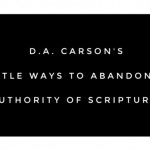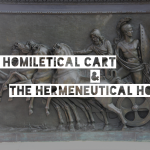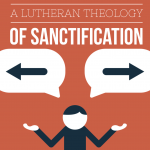 How would you feel if every time your child messed up, got in trouble, failed a test or sinned against you, they resolved to pay you back? They tried to please you with work or gifts. They tried to gain favor by serving. They felt as though your love and your acceptance would only return if they did enough to make up for the wrong. They continually tried to even out the ledger with credits to balance the debits.
How would you feel if every time your child messed up, got in trouble, failed a test or sinned against you, they resolved to pay you back? They tried to please you with work or gifts. They tried to gain favor by serving. They felt as though your love and your acceptance would only return if they did enough to make up for the wrong. They continually tried to even out the ledger with credits to balance the debits.
As a parent, who loves your children, you would say something like, “Stop, I love you anyway.” Or, “Hey, you don’t have to do anything for my love, I love you just as much today as I did yesterday.” Or, “I want you to obey, but I don’t want you to work for my love… you already have it.”
Christians habitually act this way towards their heavenly Father. We read commands in Scripture, we know what God desires, and yet, we mess it up… always. And what is our inclination? To make it up to God. To do more. To try harder. To gain back His favor.
The Sinful Son
Consider the parable that Jesus told the religious leaders who were condemning Him because He ate with “tax collectors and sinners.”
And he said, “There was a man who had two sons. And the younger of them said to his father, ‘Father, give me the share of property that is coming to me.’ And he divided his property between them. Not many days later, the younger son gathered all he had and took a journey into a far country, and there he squandered his property in reckless living. And when he had spent everything, a severe famine arose in that country, and he began to be in need. So he went and hired himself out to one of the citizens of that country, who sent him into his fields to feed pigs. And he was longing to be fed with the pods that the pigs ate, and no one gave him anything (Luke 15:11-16).
This wealthy father’s son wanted nothing to do with his family or his dad. He asked for all the blessing that he didn’t earn and abandoned the family. After he hit rock bottom from a lifestyle of sin and recklessness, he realized that his routine was not sustainable.
But when he came to himself, he said, ‘How many of my father’s hired servants have more than enough bread, but I perish here with hunger! I will arise and go to my father, and I will say to him, “Father, I have sinned against heaven and before you. I am no longer worthy to be called your son. Treat me as one of your hired servants’ (Luke 15:17-19).
The Plan
The son had a plan. He was going home, but needed to say three things to his dad:
- I have sinned against you
- I am not worthy to be called your son
- Treat me as one of your servants
The first two steps in his plan are confessional. He plans to approach his dad, who he wronged, by confessing his sins and also acknowledging that he doesn’t deserve his father’s grace and forgiveness.
The third step in his plan is different. If the first two steps are confessional, the third step is imperatival. Saying, “treat me as one of your hired servants,” is not a confession, it’s a command. Quite literally, it’s an imperative. He is telling his father “because I wronged you, and because I don’t deserve your favor, make me work for it.” He is saying “treat me as a slave so I can make things right.” It’s a command to allow him to pay the father back. The son wants to work it off. He wants to make things right. He wants to pull himself together.
The plan is set. Here it goes:
The Interruption
And he arose and came to his father. But while he was still a long way off, his father saw him and felt compassion, and ran and embraced him and kissed him. 21 And the son said to him, ‘Father, I have sinned against heaven and before you. I am no longer worthy to be called your son’ (Luke 15:20-21).
This is strange. Why is the father so happy to see his son? Why is he showing compassion? The son certainly doesn’t deserve it. In any case, the son is following his plan. He has three steps to his plan. He completes the first two steps: He confesses his sin and expresses his unworthiness to receive favor. Here comes the third step—the part where he tells his dad that he’ll work it off, pull himself together and make things right.
But the father said to his servants, ‘Bring quickly the best robe, and put it on him, and put a ring on his hand, and shoes on his feet. And bring the fattened calf and kill it, and let us eat and celebrate. For this my son was dead, and is alive again; he was lost, and is found.’ And they began to celebrate (Luke 15:22-24).
The third step was never accomplished. As the words were on the son’s lips—as he was about to say, “Make me your servant so I can make things right,” the father interrupts and says “Let’s celebrate!”
The Treadmill
Christians often, maybe extremely often, approach their heavenly father this same way. We confess our sins, we acknowledge our unworthiness and then we work. We work hard. We start doing stuff. We pull ourselves up to make God want to love us again.
We like to feel like we are contributing to the process. Just like when my son grabs a toy hammer and pounds the wall as I make a repair at home, we are always seeking to work alongside God as if we can contribute to the process. I can assure you that my son’s plastic hammer has never contributed to any project at home.
We like to get on the treadmill and run. We like to work and sweat and strive. We like to feel like we have earned something. The problem with treadmills is that you do work and you do get tired, but you don’t actually go anywhere.
Don’t be fooled. The gospel of Jesus Christ does not include a treadmill. The gospel found in Scripture is a gospel that distinctly teaches that the only movement toward God is the movement of God in us. The pseudo-gospel treadmill is a fabrication and an exceedingly dangerous distortion.
Life change begins to take place when a sinner is filled with the Holy Spirit. However, when that Sprit-filled sinner stumbles, jumping on a treadmill does not fix the problem. It only consumes time and fatigues. Christians must keep reminding themselves that God does not require life change for cleansing, but rather cleanses, which leads to life change.
I am astonished that you are so quickly deserting him who called you in the grace of Christ and are turning to a different gospel— not that there is another one, but there are some who trouble you and want to distort the gospel of Christ. But even if we or an angel from heaven should preach to you a gospel contrary to the one we preached to you, let him be accursed. As we have said before, so now I say again: If anyone is preaching to you a gospel contrary to the one you received, let him be accursed (Galatians 1:6-9).
Jump off the pseudo-gospel treadmill and walk through the torn curtain that once denied you access to God.
Jesus paid the penalty.
The curtain was torn.
It is finished.
Praise Jesus.











